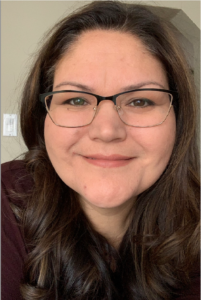Educator decolonizes curriculum through story

By Kelly Anne Smith
NORTH BAY— A presenter at Nipissing University’s Indigenous Week hosted by the Enji giigdoyang – Office of Indigenous Initiatives, Lorraine Sutherland gave a talk titled Tipaachimowin/Tipaachimowina Matter. The content stems from the learning she did while on campus at Nipissing University as well as in community back home in Attawapiskat and from the teachings she received.
“Everything I’m going to share today, is my dibaajimowinin or my dibaajimona. I ask you to sit back and listen. It is my hope you come away from today with something that speaks to you. That is the whole point around what I have learned from dibaajimowinin and sharing that is at any given time that you share or hear story, it will apply to your life in whatever way that means for that time and being,” she explains. “I’m about sharing. I believe in sharing story and also learning from it and taking that information and using it in the best way and respectful way that I can. When I receive story, I’m always aware of how I carry that and how I use it, of course, with permission from people who share it.”
Her presentation is based on her own experience and learning in life and ceremony learned by being on the land and living by the land in her home community. Sutherland says Elders can be included as teachers.
“It could be parents, aunties, uncles, nieces and nephews, everyone, it’s all about teaching and learning. We have a sacred responsibility to ensure that to all our children that come into our care,” she says. “One of things about reconciliation, is that we are learning together. For some of us, learning our history might be new to us. Everybody is at a different place in that. We need to learn together and ensure the children and the youth that are coming forward about who they are.”
There are key questions that have guided Sutherland’s work in education, with teaching and learning including: Who am I? Where do I come from? Why am I here? Where am I going? What is my legacy?
“Reflection is a big piece for me in understanding where I come from, where I am now and where I’m going. That informs everything that I do. It may inform you, as they really do apply to anything.”
Sutherland didn’t always know she was Indigenous as she grew up in Attawapiskat, Toronto, North Bay, and Timmins.
“I’ve been on this journey of reclaiming. Reclaiming who I am. Reclaiming my language and my heritage. I now know I’m a strong Ininiw Iskwew. I’m very thankful I can speak the language and that I know where my traditional family territory is. I’m grateful I’m able to go there to live on the land and be by the land. And to practice ceremony. Specifically, how to live off the land like my ancestors before me.”
After achieving her B.A. History at Nipissing University, Sutherland approached John Long to be her Master’s advisor. He had been on the coast and could speak the language. Consulting Long about writing her Master’s thesis on her mother and Indian Residential School, Sutherland asked if she could skip the part that she went to St. Anne’s. He said no.
“That really made me understand the importance of telling story. And some of that story is traumatic, that residential schooling. But there is also story along that traumatic experience of happy, good stories that didn’t happen when they were in school. Those are very, very important. We do have to tell this story of trauma but we also have the story of who we are and the pride that we have. And what we do when we are in community that is so very different than what is shared on the media, that we are happy people. We are capable of sharing good stories by having those good experiences on the land.”
Sutherland has worked on curriculum to incorporate Indigenous perspectives. As a Mushkegowuk regional assessment lead, she was first using assessments that were Western tools.
After doing her Master’s in Indigenous oral history, it was a complete flip.
“I’m being asked to use these tools that are not culturally relevant. Over time, we were able to create culturally-relevant assessments… Let’s listen to story orally. Let’s read it. Now, how can you incorporate that into always using that story telling lens in that approach?” she says. “Students in Grade 5 would laugh when I talked about ceremony and drumming. And then through sharing with them and reminding them, ‘Before we had the Roman Catholic Church, and there is nothing wrong with that, that is part of who we are now, but prior to contact, we had ceremony. Those are your relatives, five generations before you. We need to honour and respect that. That really changed their perspective. I’m trying to find ways through understanding our history through story.”
Sutherland says she would take a piece from the curriculum, move it aside, and insert Omuskego history. The educator’s work is not done.
“Last year, with all of the unmarked graves that have come up… I’m aware that this is still ongoing. This is what we are working through and trying to understand. That sparked for me, I need to take care of myself. I need to tell my story now because my mother is the survivor, but I am too a child of that Residential School Survivor. I feel that my story needs to be told too and understand how that impacted me.”


